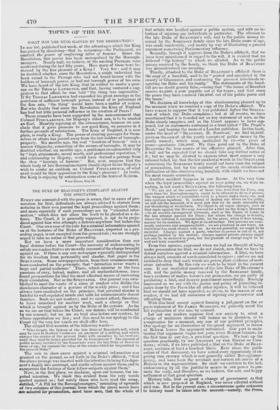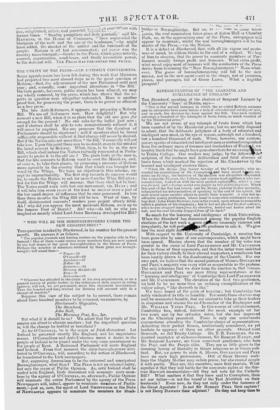THE DUKE OF BEAUFORT'S COMPLAINT AGAINST THE SPECTATOR.
EVERY one connected with the press is aware, that in cases of pro- secution for libel, defendants are always advised to abstain from
noticing in their own journal the legal proceedings against them ;
and more especially if such proceedings are by "criminal infor- mation," which does not allow the truth to be pleaded as a de-
fence. The Court, it is generally supposed, is apt to be preju- diced against him who attempts a defence anywhere but before the Court. Our own case of the rule for a criminal information against
us at the instance of the Duke of 'BEAUFORT, (reported in a pre- ceding page), is not excepted from the general rule ; we are strongly urged to take no notice of that proceeding.
But we have a more important consideration than our legal defence before the Court—the necessity of endeavouring to satisfy our readers that we are morally innocent of the charge brought against us. If there is any one newspaper especially distinguished for its freedom from personality and slander, that paper is the
SPECTATOR. Some newspapers have, from their commencement, been conducted on the principle, that "detraction never wants a large and partial audience." These, which minister to the base passions of envy, hatred, malice, and all uncharitableness, have found prosecutions for libel the most effectual means of increasing their circulation. Not so the SPECTATOR. Our journal was esta- blished to meet the wants of a class of readers who dislike the slanderous character of a portion of the weekly press ; and it has always been conducted on the principle, that personal slander is hateful to well-regulated minds and unfit for admission into decent families. Such are our readers ; and we cannot afford, therefore, to leave unnoticed for another week, such a charge as that which is brought against us by the Duke of BEAUFORT. As far as we are on trial before the Court, our defence will be conducted by our counsel ; but we are on trial also before our readers, by whose approbation we live ; and this must be our apology to the Court for the very few words we shall offer here.
The alleged libel consists of the following words-
" Who forgets the history of the late Duke of Beaufort's will, which may be seen at Doctors' Commons on payment of a shilling, and which charges the estates of the present Duke with annuities to his brothers until they shall be better provided for by Government ? The amount of public money received by the Somersets since the late Duke of Beaufort came of age, far exceeds the value of the estates which he bequeathed to the present Duke."
The rule to show cause against a criminal information was granted on the ground, as set forth in the Duke's affidavit, "that the above passage was inserted with the intention to bring this depo- nent's family into contempt, and excite odium against them, and to exasperate the feelings of their fellow-subjects against them."
Now, in the first place, we disclaim, upon our honour, the im- puted intention. We think this evident from the very words quoted against us ; but surely those who have read the essay, entitled, "A Pill for the Boroughmongers," consisting of upwards of two columns of this journal, from which the above seven lines are selected for prosecution, must have seen, that the whole of that article was levelled against a public system, and with no in- tention of injuring any individuals in particular. The allusion to the late Duke of BEAUFORT'S will, and to the public money re- ceived by the SOMERSET family since the late Duke came of age, was made incidentally, and merely by way of illustrating a general- argument concerning Parliamentary influence. Secondly, though it appears from the Duke's affidavit, that we have been misinformed in regard to the will, it is evident that we believed " the history' to Which we alluded. As to the public money received by the family, we think the Duke of BEAUFORT has misunderstood our meaning.
Thirdly, attached to the Duke of BEAUFORT'S affidavit there is the copy of a handbill, said to be " posted and circulated in the county of Gloucester, and containing the grossest falsehoods re- specting the Duke and his family." '''The statements of the hand- bill are no doubt grossly false,—being that " the house of Beaufort receive 48,6001. a year payable out of the taxes ; and that since the peace they have received 720,000/. out of the public purse and the taxes."
We disclaim all knowledge of this electioneering placard up to the moment when we received a copy of the Duke's affidavit. We have reason to suppose that it was published before the SPECTA- TOR of which the Duke complains ; but at all events, we have ascertained that it is founded not on any statement of ours, as the Duke clearly imagines, and as the Court appears to have sup- posed, but on statements contained in a tract called " The People's Book," and bearing the name of a London publisher. In this book, under the head of " BEAUFORT, D. Somerset," we find 48,6001. given as the sum of all the yearly receipts of public money by the flimily named ; which sum, multiplied by 15—tlie years of peace—produces 720,0004 We thus point out to the Duke of BEAUFORT the true source of the offensive placard. After this, it will not "be expected that we should take any further notice of it ; but we may be allowed to express what must appear a very rational belief, viz. that the few incidental words in the SPECTATOR concerning the SOMERSET family would not have been the subject of prosecution, but for the accident of the nearly simultaneous publication of this electioneering handbill, with which we have not the most remote connexion.
Another accident happens in our favour. At the very time when the legal proceedings against us were going on, we were in- serting, in last week's SPECTATOR, the following lines. " We are not of the number of those who hold that the Press, any more than the Boroughmongers, ought to be allowed to do as it pleases. The weapon which we journalists wield is a heavy and a sharp one, and asks cautious handling. If, instead of dealing our blows on the guilty, we will fell the innocent, it iS most just that we be made amenable for our blundering or wickedness. We object to all vague charges, such as that made against the Morning Journal for a libel on the King's Ministers —to all morally incompetent tribunals, such as the House of Lords in the late attempt against the Times ; but where the charge is definite, where the tribunal is unimpeachable, let the press, when it does wrong, answer for its conduct. We fight at an advantage. Our persons are corn. monly unknown and unapproachable ; we are practised in our fence. An individual has small chance with us. As we are powerful, we ought to be merciful. Charges against a party, whether in power or out of it, are perhaps justified by the motive; charges against private persons ought not only to be motived in good, but the grounds of charge ought to be well and truly considered."
From this opinion, expressed when we had no thought of being under prosecution for libel, we do not shrink, now that we have to defend ourselves against a criminal information. A libel, we have always held, consists of words calculated to injure ; and we are not inclined to deny that such words are prima facie evidence of wal- eious intention. By this rule we wish to be tried in the present case. If our incidental mention of the late Duke of BEAUFORT'S will, and the public money received by the SOMERSET family, bears evidence of malice towards our prosecutor, we are guilty of publishing a libel, and deserve punishment accordingly. Strongly impressed as we are with the justice and policy of punishing in- juries done by the Press like all other injuries, it will be believed that we should not have appealed, as above, to the reason of our readers, if' we had felt conscious of injuring our prosecutor and offending them. .
With this brief caveat against forming a judgment on the ex parte statement of Sir JAMES SCA.RLETT, we patiently await the full explanation of our case by counsel. Let not our readers suppose that our anxiety to rebut a charge of malicious slander will induce us to abandon, or to compromise for a moment, any one of our political principles. Our apology for an illustration of the grand argument in favour of Reform leaves the argument untouched. Our part in main. taming that argument began last year, when Reform became, ft:it the first time in our day, a practical question. We tool; up the question practically, by our ANATOMY OF THE HOUSE OF COM- MONS; which, if we have published a libel on the Duke of BEAU- FORT, contains at least a hundred libels. Ever since the publi- cation of that document, we have seized every opportunity of ex- posing THE SYSTEM which is now generally called Boroughmon- gering, and have been the constant and earnest ad-, ocal es of a Reform in the representation. So shall we continue to the last, endeavouring by all the justifiable means in our power to pro- mote the early, and therefore, as we believe, the safe and happy settlement of that great question. History tells, that so great a change of government as that which is now proposed in England, was never effected -without civil war. But in the present case, a circumstance quite unknown to history must be taken into the account—namely, • the Press,
on with ,,„„„s k:; free, enlightened, active, end powerful, — sensinar
former times. " Suoday pamphlets and daily journals," said Mr. HAWKINS, in the liouse of Commons, " have superseded the bludgeon of the mob and the axe of the headsman,"—he might have added, the musket of the soldier and the barricade of the people. Reform is all but consummated ; yet never was the country more tranquil;—thanks to the Press, which gives activity, concert, organization, confidence, and finally irresistible power, to the national Will. THE PRESS HAS PRESERVED THE PEACE.




























 Previous page
Previous page